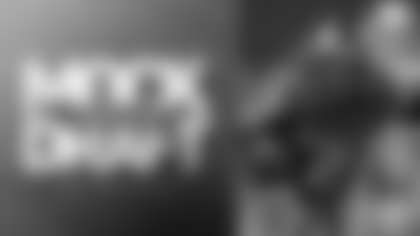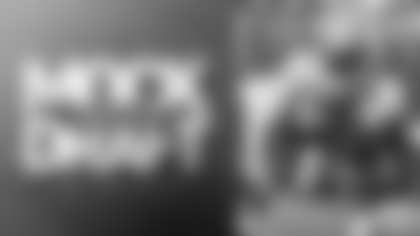JACKSONVILLE – The offense is pretty much installed.
That doesn't mean the work is anywhere close to done. And Jedd Fisch said that doesn't mean every player is immersed in every facet of the scheme, but the first-year offensive coordinator said the process is very much underway.
So far, so good.
"They've been taught 90 percent of the offense," Fisch said recently during a break in 2013 organized team activities, which continue Tuesday at the Florida Blue Health and Wellness Practice Fields adjacent to EverBank Field.
"We're going to teach it to them again in training camp. We're going to teach it again when preparing for the four preseason games, and we've already taught it to them in the first phase, when we weren't on the field. They should hear it between three or four times before we start game-planning for a regular game.
"Do they know it? No. But they're learning it and becoming more comfortable speaking the language."
And just what is this offense being installed? How best to describe it?
Quarterbacks have talked about liking increased freedom at the line of scrimmage, and others have talked of it bringing out the strengths of individual players. Players mostly talk about tempo, something Fisch emphasizes, too.
"We believe in playing fast," Fisch said. "Whether that is tempo in and out of the huddle, or whether that's tempo at the line of scrimmage or whether that's tempo after a play, our core values are playing fast, playing hard and playing together. That's going to be part of our mantra from the get-go.
"How fast we play and how we do it, we'll make that decision as we go."
And unlike last season, when Head Coach Mike Mularkey and a coaching staff featuring five then-current or former offensive coordinators spent much of the offseason installing the playbook, Fisch said this scheme is very much the sum of what he has learned in previous stops.
"We're not doing that," Fisch said of the group approach. "For the most part, our offense is a combination of all the places I've been."
Fisch on Wednesday took time during a break in OTAs to discuss:
Q: This is very much your offense that you brought with you, but how much is based on the personnel here?
A: You put in a system, and then as we start evaluating our players, we start determining which plays or concepts in our system we can use, which ones we'll throw out and which ones we'll tweak.
*Q: So from year to year...
*
A: From year to year, from OTA to training camp, from OTA to minicamp we might make decisions and say, 'We don't have guys who can give us this, so therefore we're going to do things they do really well.' Our whole system is going to be built upon what our players do well, because almost every NFL playbook has enough plays where if they got dropped off a Pro Bowl tight end, Pro Bowl wide out, Pro Bowl running back or Pro Bowl quarterback they could determine what plays they were going to call. But right now, as we're building it, we're going with the whole.
*Q: So a big part of the install is indeed figuring out what you've been given to work with...
*
A: Every day we're evaluating from individual drills to teamwork. We're really looking at their skill sets. When you look at guys' skill sets, certain things will just start coming together and crystallizing. That's where we're at right now. We're trying to build into training camp what we need to see from our guys.
*Q: Let's talk quarterback...
*
A: Right now, the way I look at it is Blaine (Gabbert) and Chad (Henne) have been here since the very beginning. They've been throwing with the ones and the twos. Truthfully, we're still trying to figure out our ones and twos at the receivers, and without MoJo (Maurice Jones-Drew), we're trying to figure out our running backs. It's really 22 or 25 guys competing for the starting roles. But as we continue on, it will start crystallizing more at that position, then we'll make that decision.
Q: When you look at Gabbert and Henne, what do you see?
Q: With Blaine, you can't help but seeing his physical attributes. That's the first thing you notice. You notice someone big, strong, fast, athletic. That's exciting and right off the bat you notice that. The next thing you notice is how hard he works. His work ethic has been incredible and it has been everything you could ever ask for. He is the first guy in the building, the last guy to leave. He's the cliché. As much extra time as he can spend, he spends working on his craft, working on his body, working on his film work. It's important to him. That's the thing you can't see on film. I've learned it's very important. I've also learned how important his relationship with Chad is. They do a great job of trying to make the other guy better. Chad is very smart. He has very good command presence. You can feel, "five-year vet," but from what I've been told, you can also see Blaine's maturing. Both of them together have caused the other one to work hard. Chad grinds, so now Blaine grinding, so they're forcing one another to be better in so many different ways, so it's fun to watch. They're just going at it with the singular focus to get better and they're focusing on themselves. That's the main focus. The rest of it will come.
Q: And in your offense, those guys will have responsibility – and freedom – at the line of scrimmage.
A: How can you handcuff the guy behind center? In my opinion, he sees it the best. He should have the best feel for what we're trying to get accomplished. Why have dead plays? If he can help us get into a better play, then it's the opportunity for that guy to do that. We'll never get in the way of that. I want them to go from being a residence to being a full-time surgeon. Their residency program is training camp, OTAs, minicamp. When we get going, they have to feel like they can go.
Q: Matt Scott was signed as a rookie free agent. Talk about where he is in this. Can he start?
A: Not today. Right now, Matt has been here for one rookie minicamp practice and has probably taken 10 plays. Matt Scott is being developed. There's no rush. We're not trying to push anything through. We're excited about his talent. That's kind of where we're at with him.
*Q: Two weeks into OTAs, your impression of what you have to work with compared to what you thought going in...
*
A: There is a lot of excitement in regards to how many different people can push other people. Luke Joeckel can push Eugene Monroe to get better. Cameron Bradfield can push Luke Joeckel to get better. Will Rackley can push Uche Nwaneri to come back quicker. Then there's who's going to be the second tight end? It is going to be (Isaiah) Stanback or is it going to be (Brett) Brackett or is it going to be Allen Reisner? What you don't see on tape is the internal drive, which you now experience because competition always makes people better. That's what's been the most exciting part of this last five weeks – watching how everybody has stepped up their game because there's somebody forcing them to do that.
Q: Offensive line – where do you see it, and where does the addition of Luke Joeckel help?
When you take the No. 2 overall pick, it should help everywhere. We now have two Top 10(-drafted) tackles, with Eugene (Monroe) and Luke. We have two guys who are going to be long-time starters in the NFL at tackle. We also brought back a 13-year starter at center...
Q: Was that last part, bringing back Brad Meester, important to you?
A: It's very important to a young quarterback and a new system that you have someone who has veteran experience and savvy and has seen it and done it over and over. He has to make calls and communicate with quarterbacks. You also have Will Rackley coming back. He's a very good football player. You also have Uche (Nwaneri) coming back, a very good football player, and because he's not practicing, other guys are getting better. Austin Pasztor's getting better. He's now taking snaps at guard. Mike Brewster is getting better. He's taking snaps at center and guard, so the offensive line as a whole should play at a pretty high level.
Q: There was so much talk around the draft about the stat of how much better Gabbert was with even fractions of seconds more to throw. How much did that play into your comfort level with the Joeckel selection?
A: (Smiling) I know this: I know everybody's better with more protection. It gives the wide receivers more opportunity to get open. It gives more running lanes. It makes it hard on the defense. It gives the quarterbacks more time. It gives Marcedes and the tight ends a chance to get out in routes more. It gives you not just two-man combinations, but three-man combinations. There's so much that goes with solidifying the line than just, 'Solidifying the line.' You can't just say, 'We got better on the offensive line.' No, no, no. We got better at all 11 spots because of the fact that we invested in the offensive line. That's exciting.
*Q: I'll throw out the names and you respond. Cecil Shorts..
*
A: Very hard worker, explosive, everything you want at that position...A-plus character.
*Q: Marcedes Lewis...
*
A: Tremendous worker, incredible blocker – it's underrated what type of impact he can make in the passing game. I'm excited to watch what he can do. This offense should work for him. It's worked for other tight ends. He's really committing to buy in and believe in the system. Obviously, the more times he can get out in a route, the more times he'll have an opportunity to impact the game and touch the ball.
*Q: Justin Blackmon...
*
A: Great hands, a really good worker – and an incredible teacher on the field to the young guys. He spends a ton of time on the field trying to make people around him better. He's picking up the offense at a very quick pace, and he's been able to help and impact the other guys.














